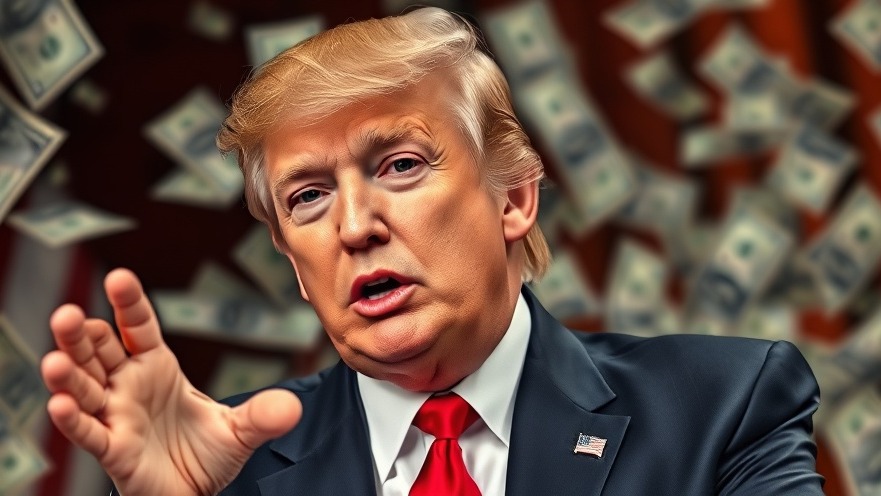
Understanding Dollarization: A Key Issue in American Economic Policy
In a recent dialogue, former President Donald Trump weighed in on the topic of dollarization, asserting that if current Vice President Kamala Harris had assumed the presidency, the dollar would no longer be the primary currency. This assertion ignites critical discussions surrounding economic stability, currency value, and the future of the U.S. dollar as a global standard. The implications of dollarization could reverberate through international trade, domestic purchasing power, and overall economic security for Americans.
In Trump: If Kamala Won The Presidency, 'You Wouldn't Have The Dollar As Your Currency Anymore', the discussion dives into the potential impacts of dollarization, exploring key insights that sparked deeper analysis on our end.
The Economic Dominance of the U.S. Dollar
For decades, the U.S. dollar has held a preeminent position on the global stage. As the go-to currency for international transactions, it facilitates trade and offers advantages not available to nations relying on alternative currencies. Trump's comments hint at a fear that a shift away from the dollar could significantly undermine its value and diminish the United States' economic power. Understanding this scenario is essential as it relates directly to citizens' everyday lives, impacting prices on goods, inflation rates, and even job markets.
BRICS and Its Impact on Global Currency Dynamics
The former president referenced the BRICS alliance—a coalition of major emerging economies including Brazil, Russia, India, China, and South Africa—as a significant challenge to U.S. currency dominance. Recently, discussions around BRICS considering a common currency have stirred fear of dollar depreciation. If successful, this could encourage greater global trade in currencies other than the dollar, a predicament that would shift economic power away from the U.S. The implications for how Americans interact with the world economically are profound, suggesting potential impacts ranging from job security to consumer prices.
Future Predictions: What Lies Ahead for the Dollar?
As the financial landscape evolves, predictions regarding the dollar's durability are speculative but essential. Economists often debate potential outcomes based on varying factors, including global trade relations, U.S. fiscal policy, and geopolitical tensions. If countries like China and Russia increasingly engage in trade without utilizing the dollar, we might witness a drastic shift in currency reliance that could affect everything from everyday purchases to funding for critical public services.
Understanding the Stakes: The Value of Informed Conversations
Trump's pronounced stance on maintaining the dollar as a key player in global finance echoes a frequent theme in current national debates. The conversation around dollarization reminds us that economic policies directly affect citizens' lives, governing everything from housing affordability to inflation rates. Being informed about such conversations allows the public to engage meaningfully with national political news and advocate for policies that benefit the economy and community at large.
Decisions Youth and Young Adults Can Make with This Information
As the U.S. grapples with fluctuating economic conditions, young individuals entering the workforce or managing finances can draw vital strategies from these discussions. Understanding the implications of dollarization and potential economic shifts allows future generations to make informed decisions about investments, savings, and career paths. Informed citizens contribute to a healthier democracy, representing diverse perspectives and championing informed choices that can shape policies positively.
Addressing Common Misconceptions Around Currency and U.S. Economic Policies
Misunderstandings about dollarization and the role of various currencies are common. Some believe that shifting away from the dollar would automatically lead to increased trade opportunities without realizing the potential risks involved. Addressing these misconceptions is crucial as it allows for a more informed electorate that can engage effectively with national issues. The nature of economic policies and their implications should spark thoughtful dialogue rather than fear-laden rhetoric, grounding discussions in facts rather than speculation.
Conclusion: Engage with the Economic Discourse
Given the complexity and impact of dollarization on the U.S. economy, it is imperative for citizens to engage in these economic conversations actively. They affect not just personal finances but also the broader landscape of U.S. policy and international relations. As citizens navigate these discussions, staying informed and proactive will prove essential to shaping a sustainable economic future for all Americans.
 Add Element
Add Element  Add Row
Add Row 



Write A Comment